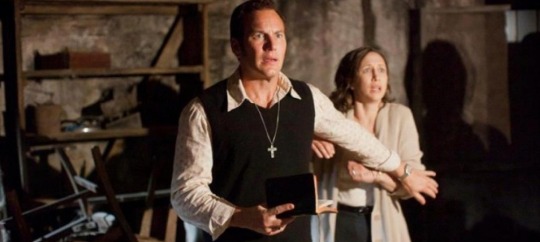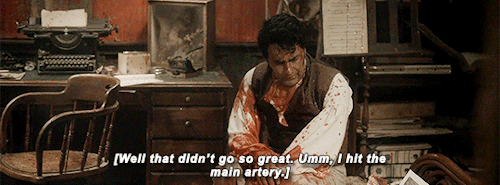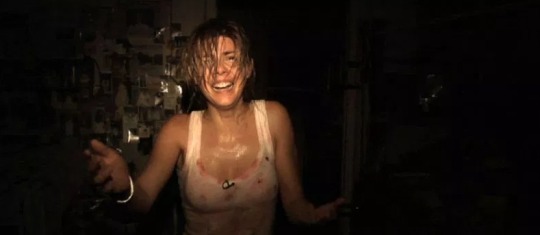#strange that as we become a more secular society we continue to cling to like
Text
gonna try not to go on and on because i have other things i told myself i'd work on this morning but it truly is such a strange experience seeing how much of like...online/popular discourse about morality echoes conservative religion. like. idk man maybe it's the perspective of having been raised in a conservative religious environment that was very centered around stuff like guilt and control and then growing older and losing that religion and separating myself from that environment but. it's just crazy to me how much supposedly "woke" or "progressive" rhetoric is almost indistinguishable from the conservative christian rhetoric i was raised with at its core. like:
idea that "sin"/perceived bad actions means a person is fundamentally "sinful"/evil/bad
idea that consuming any "sinful"/bad/"problematic" media/literature/art makes YOU a bad person
using morally weighted labels to discourage critical thought or nuance. like. if something is labeled Evil by the Group then you must accept it as Evil. if something is labeled as Good by the Group then you must accept it as good
emphasis on punishment + guilt!! if you fuck up you must Get On Your Knees and Repent
there's definitely more to be said but...yeah! idk it's just kind of scary to me that if you replace the word "problematic" with the word "sinful" a lot of the rhetoric i see coming from ostensibly progressive circles could literally be something i'd hear sitting in the pews of my old church lol
#strange that as we become a more secular society we continue to cling to like#these extreme moral undergirdings#ranting and raving#txt
83 notes
·
View notes
Text
Modern life includes this strange reality—in the midst of it are millions of people who claim that they have a personal relationship with a man who died 2,000 years ago. These people are treated as a normal part of the world... and yet they say that this ancient man, Jesus, was raised from the dead, is still alive (is, in fact, alive forever), and is their friend. We can see why this sometimes drives atheists and secularists to exasperation. They must ask themselves, “Am I the only one bothered by this? Doesn’t anyone else see how weird it is that all around us are people who claim to know a dead man of the ancient world?” Certainly, part of the reason that this claim of friendship with Jesus is acceptable even in the modern world is that it is not a new thing. People tend to be respectful of things that have been around for a long time. And, what is more, even the secular person has to admit that Christians generally behave themselves. For the most part, they contribute to civic life and go along with progress. They are only dangerous (to the secularist way of thinking) when they get in the way of progress. In the eighteenth century, for instance, the complaint was that Christians got in the way of political revolutions. In the early twentieth century, the complaint was that they got in the way of economic—especially socialist—revolutions. More recently, especially with the broad acceptance of evolutionary biology and with medical innovations in birth control, abortion, and embryonic research, the complaint has been that Christians get in the way of science. Still, for the most part, Christians don’t go out of their way to make trouble, and, because their beliefs are ancient, they get a pass when it comes to their head-scratching ideas about Jesus. I suspect that it’s also the case that, recently, secularists have comforted themselves with the notion that belief in Jesus is on its way out. This strange situation—a modern world filled with so many people who cling to the pre-modern claim that Jesus is alive—can’t go on forever. To some extent, they have been right. A good portion of the world has undergone or is undergoing a process of de-Christianizing. But even this de-Christianizing hasn’t entirely done the trick. Every day, new people are claiming that Jesus lives and that they know Him, and in some places where de-Christianizing had looked quite successful, there are signs of re-Christianizing. And wherever people claim to have met Jesus, they also report that their life has become more contented and more peaceful. They are happier.
No, life as a follower of Jesus does not suddenly lose its frustrations, nor do evils disappear, but even amid the hurts and wrongs of the world a new thing becomes present in the follower of Jesus, at least if their testimony is to be believed. This new thing lightens hearts and opens new possibilities. To the propagandists of the modern world, this happiness must be a great lie or at least a delusion, and so they caricature Christian joy as if Christians were actually secretly creepy or twisted. Likewise, the real history of Christian culture is often distorted by those who cannot accept that followers of Jesus are really as happy and at peace as they claim. They exaggerate the violence and venality of Christian society and excuse the far harsher violence and venality of pre-Christian society in order to deny a reality that is obvious to any sane person: in countless families and tribes, nations and cultures, wherever the story of Jesus took root, a new element appeared in the alloy of culture, giving it new potentials. This, too, is part of the strangeness of the story of Jesus. Wherever it takes root, society becomes manifestly less violent, more educated, and generally happier; but somehow the world spends a lot of time saying the opposite. It is almost as if there were a spirit loose in this world of resistance to Jesus. But even in a society, like ours, that refuses to recognize its own history, the Name of Jesus does not fade. Even as our society reduces Christianity to a marginal role, the story of Jesus risen from the dead is still shared, and people continue to claim that they have met Him, that He has changed their lives, and that He is their friend. You simply cannot claim to be an open-minded and rational adult without, at least once, giving this strange reality fair consideration. Likewise: given the claims made about Jesus, His extraordinary teachings, and His towering place in world history, a reasonable adult really can’t go through life without giving these things open-minded consideration, at least once. Yet many try. Why?
Part of the reason may be that there is so much emotion and cultural strife surrounding Him. Even those who develop an interest in finding out about Jesus might remain silent about their interest in order to protect themselves from the avalanche of other people’s feelings and opinions that will surely fall on them if they ask even the smallest question about Jesus. There is something reasonable about this. Modern society is constantly being swept by fads and movements, which is tiring. The person who does not jump at every claim is often the most prudent. But Jesus is not one of those fads or movements. He far predates all of that, and His influence has persisted for so long that it calls upon us to overcome our reluctance and think the whole thing through, as I said, at least once. The Jesus phenomenon is strange in its origins and in its consequences. Whatever happened in Judea around the year 30, it is utterly unique. Nothing like it has happened before or since. And although we can also see plainly that Christians have become corrupt again and again, and that the Name of Jesus has been abused by preachers, politicians, and prudes, the allure of the Man Himself (and of the saints, artists, thinkers, and ordinary people whom He inspired) presses each of us for a response. His claims about Himself call for an answer: Who is this? His transformative place in history also calls for an answer: should I follow Him or reject Him?
Cy Kellett
#cy kellett#jesus christ#catholicism#truth#atheism#secularism#we have been chosen out of the world#this is very relevant to the world lately#stand strong in the faith#be not afraid#this is why i love being catholic#follow jesus
2 notes
·
View notes
Text
Religion’s Rocky Relationship with Horror Film: The Conjuring & [REC].

The horror genre has had ties with religion, going back to its roots in Gothic literature. The vampires in Dracula were warded off by religious icons and holy water and possession is often the work of the devil. Religion is often the saving force; the priest exorcises the devil and crucifixes repel the advances of the blood sucking vampires. However, what happens when religion can’t save the day?

In an increasingly secular society, horror films have changed their representations of religion, either becoming suspicious of it, or scrambling to portray religion as the saviour in horrific situations. Two contemporary horror film franchises, one American, one Spanish show both sides of this. James Wan’s The Conjuring and Balaguero & Plaza’s [REC]. Although these films are wholly different in style and subject matter, this contrast enlightening when looking at how horror can interact with religion.
[REC] is a found footage film, shot by a journalist documenting a night in the life of a Barcelona fire station. They are called out to an apartment block, which is very quickly put under quarantine upon their arrival. Over the course of the film we discover that a deadly infection is spreading around the apartment block, seemingly originating in one of the residents’ dog. From this, the audience assumes rabies, which is a common explanation for zombie movies, and in this case, the horrific and animalistic nature of these ‘zombies’ does not dispute this. On the surface, [REC] appears to be a zombie apocalypse film and it pretty much is, until the end segment of the film.

As the film reaches its climax the filmmakers enter the penthouse to find a room filled with religious iconography alongside newspaper clippings reporting a girl possessed. This immediately switches this film from your typical zombie apocalypse film, alluding to something more sinister. On watching this part for the first time, I just thought that they were trying to give a religious explanation for the infection, it was just a misinterpretation, however on viewing [REC]2 it explicitly connects the infection with demonic possession.
I don’t know about anyone else, but for some reason the film became 100% creepier as soon as they entered the penthouse and saw what looked like a conspiracy theorists obsession, paired with the log of a Vatican agent on old tapes playing in the background. This mystery is completely unexpected and turns the whole film on its head.
But why bring religion into what, on the surface appears to be a mere zombie outbreak movie? The answer can be found in Spain’s political past. Spain was under the control of dictator Francisco Franco from 1936 to 1975. Franco took power after the Nationalist victory in the Spanish Civil war, his rule emphasised conservative values, including putting a great deal of importance on Catholicism, which was the national religion during his rule. Films during his reign were heavily censored, sex, politics and religion were all no-go areas in films made in Spain during this period. After his death in 1975, there was a great change in Spain, with the country becoming more liberal (Scarlett, 113). However, Elizabeth Scarlett in Religion and Spanish Film states that although Spain somewhat abandoned Catholicism, “the motifs of Catholicism were never abandoned” and states that Catholicism is ingrained in the works of Spanish directors (171).
Therefore, [REC]’s religious imagery does not simply contain this to evoke an ominous feeling in the viewer, it is because of the lingering national Catholicism of Spain. However, in this case Catholicism is not presented as the saviour, in fact, it is the very cause of what occurs in the apartment block.
The source of the infection is the girl in the newspaper cuttings who is apparently possessed by demons, the agent kidnaps her and attempts to find a cure for the apparent biological demonic possession, however, this only makes the enzyme mutate and become highly infectious. Andy Willis suggests that for Spain with its religious history, “such references would potentially have great significance for certain members of the audience who might be willing to believe in a potential Vatican inspired conspiracy rather than excepting a supernatural rationale for the virus” (58). Does this belief, therefore lie in the potential distrust that people may feel for religion, as they had been repressed by it for years?

There is only a hint of the religious involvement in the first film, we are presented with mere speculation, however, the sequel builds upon the conspiracy providing more information about the Vatican involvement in the infection, shedding light on the seemingly demonic origins.
We hear the infected people speak in a demonic voice, repelled by items of religious significance, which immediately takes the film into the realm of the demonic and consequently heavily religious. Something that can have a voice and act in such an animalistic manner is wholly disturbing, and although the mystery is being revealed, the eeriness is still there.

Although The Conjuring may seem quite far removed in tone and style to [REC], the theme of demonic possession is at the centre of both narratives. On its release in 2013, The Conjuring was a huge hit, grossing $319.5 million worldwide, $137.4 million of that from the US. What is it about this film makes it so endearing to audiences?
I have always loved a good supernatural horror film, and this is an excellently made one. Yes, it is scary, but for me a well thought out narrative is always what I look for in a horror film. I was also rather drawn to the characters of Ed and Lorraine, played wonderfully by Patrick Wilson and Vera Farmiga. Although the characters of Ed and Lorraine are based on real people I still view the film as a work of fiction, because I don’t believe in mediums, or ghosts for that matter, as much as I would like to.
For others the story may seem completely plausible, if you believe in ghosts, God and the devil. The film is so heavily saturated with religious imagery and the script, written by the Hayes brothers (who are very Christian) are not afraid to admit that The Conjuring is a film heavily influenced by Christian values, if not a light piece of Christian propaganda. In an interview Chad Hayes stated that “we want people after experiencing our movie to question, where are they? Where am I in my own faith? Where am I in my belief? The Lord has authority overall, and so here we are”.
Being party to this information has changed the way I view the film. I must admit I am rather put out by the fact I was drawn into a film filled with this kind of preaching. There is one point where Ed looks worryingly at the father of the haunted family after he says none of the kids are baptised, essentially implying they have set themselves up for possession because they are not part of the church; providing a strange narrative based on the notion that the US is losing its faith.
The basic premise of The Conjuring films is that religion can save the day. I did notice this a lot more on watching the second one, but on re-watching the first one it is so stark. The almost saint-like depiction of Lorraine is perhaps the most apparent, more so in the second film in which she is the almost spiritual guider to the young girl who is being possessed by the demon, she acts as a kind of motherly saviour and martyr, who has suffered greatly due to her God-given gift.

The US is lead by religion, it is seen in every element of their culture, from the puritans to the present day. Politics is saturated by religion and is used to justify so many things for example, the continued control over women’s bodies. Now, with the ever-changing world religion is slowly being rejected by many, mainly the youth of the country, the emphasis on religion is going down. The Conjuring appears to be a comment on this, whilst also desperately attempting to re-ignite the countries faith. But did it work? The success of the film does make me wonder, but were the film goers flocking to the cinema due to the religious nature of the film, or just for the scares?
With two films centered around demonic possession there are interesting notes to make about their countries relation to religion. One that has rejected Catholicism and is therefore suspicious and not afraid to critique it, and the other desperately clinging to religion, attempting to scare the audiences into thinking that God can save you from demons. With all that in mind, religion does evoke such a sense of fear in horror viewers, whether they are faithful or not. I for one, would love to see more mainstream horror films in the vein of [REC], openly critiquing religion, rather than so many narratives where religion is the saviour, when in fact, it causes most of the world’s problems right now.
By Siobhan Eardley.
Works Referenced:
Goodwyn, Hannah. “Screenwriters Chad and Carey Hayes on The Conjuring and God”. CBN.com.
The Conjuring. Dir James Wan (2013).
The Conjuring 2. Dir James Wan (2016).
[REC]. Dir. Jaume Balagueró & Paco Plaza (2007).
[REC]2. Dir. Jaume Balagueró & Paco Plaza (2009).
Scarlett, Elizabeth. Religion and Spanish Film. Michigan. UP of Michigan Press: 2014, JSTOR. Web.
Wills, Andy. Transnational Film Remakes. Edinburgh. Edinburgh UP: 2017. JSTOR. Web.
#The Conjuring#Film#Review#Horror#[REC]#zombies#religion#film critic#films#horror films#writer#The Conjuring 2#Vera Farmiga#Patrick Wilson#James Wan#[REC]2#rec#rec2#Spain#spanish film#zombie film#possession#demons#demonic possession#film essay#essay#zombie apocalypse#ghosts
9 notes
·
View notes